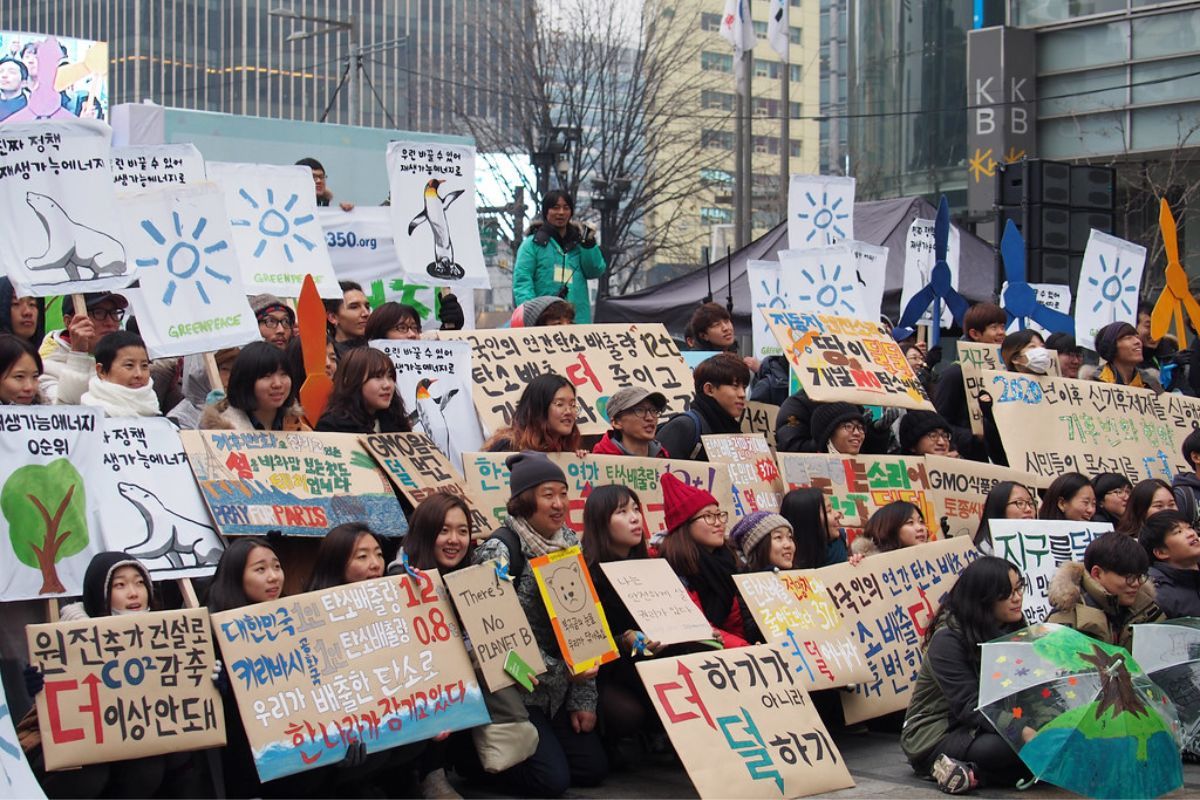On September 7, 2024, over 30,000 protesters gathered in Seoul, South Korea, highlighting the pressing issue of climate change. In temperatures over 30 degrees Celsius (86 degrees Fahrenheit), individuals of all ages rallied, demanding urgent government action to combat global warming. This event marked the largest climate action demonstration in South Korea for the year and caused significant traffic disruption in the city’s central areas.
The 907 Climate Justice March Group organized the demonstration, and a South Korean Supreme Court decision stating that the country’s climate change laws fall short of protecting fundamental human rights and setting unattainable goals for future generations gave it more traction. The court’s decision sparked intense discussions among activists, highlighting that the current climate policies are not strong enough to protect citizens from the severe consequences of climate change.
About two hundred protesters marched in Seoul, S.Korea to condemn genocidal apartheid state Israel amid extreme hit wave today.#LongLiveINTIFADA#GazaGenocide pic.twitter.com/Kc45NyX2sM
— 🍉 팔레스타인평화연대 – BDS Korea 🇵🇸 (@pps_kr) July 13, 2024
Protest banners carried phrases like “Climate Justice,” “Protect Our Lives,” and “No to Climate Villain Yoon Suk Yeol’s Administration,” referencing the current president facing criticism for environmental policies. Activist Yu Si-yun pointed out, “Without the air conditioner, this summer was not livable, and people could not live like people.” She conveyed a powerful message about the need for systemic change, stressing the climate crisis is a global issue.
Organizers chose the Gangnam area for this year’s protest to capture the attention of large corporations. Committee member Kim Eun-Jung explained the location was designed to amplify their voices against major carbon emissions contributors. “We aim to raise our voices to these companies,” she said.
South Korea aims for carbon neutrality by 2050 but is the second-largest coal polluter among G20 nations. The government faces criticism for its gradual transition to renewable energy, with activists calling for a more aggressive strategy. Last year, the government’s revision of its 2030 emissions goals, which lowered previous targets, angered environmentalists.
Climate change is affecting the everyday lives of South Koreans. Concerns have emerged about the future of iconic foods like kimchi, with farmers struggling to maintain the quality and quantity of napa cabbage due to rising temperatures. This shift showcases how climate change impacts cultural and agricultural staples.
South Korea has just sworn in Ahn Chang-ho, a homophobic figure, to lead the national human rights commission.
During his inauguration ceremony, civil society groups held a protest outside the commission demanding his immediate resignation.
📷: News1 https://t.co/yfsOcY0NQm pic.twitter.com/60uTyPj5mu
— Raphael Rashid (@koryodynasty) September 9, 2024
As the protest concluded, participants stressed the urgent need for generational accountability. Novelist Kim Ki-chang, who has participated in climate protests for three years, remarked, “This would be a bigger threat and survival issue to younger generations than the older ones, so the older generation should take more proactive steps for the next generation.”
Authorities noted that Seoul has recently recorded consecutive “tropical” nights, with low temperatures never dropping below 25 degrees Celsius (77 degrees Fahrenheit). These conditions add urgency as local citizens grapple with a changing climate.
The protest came a week after young climate activists scored a landmark victory at the Constitutional Court of Korea. The court ruled that the government’s climate change measures are insufficient to protect citizens’ rights. It was Asia’s first climate litigation ruling of its kind.
South Korea currently has no legally binding targets to cut greenhouse gas emissions between 2031 and 2049. This absence means the government cannot guarantee the protection of future generations, a right ingrained in its constitution, the court ruled.
Support us to keep independent environmental journalism alive in India.
Keep Reading
The costliest water from Narmada is putting a financial burden on Indore
Indore’s Ramsar site Sirpur has an STP constructed almost on the lake
Indore Reviving Historic Lakes to Combat Water Crisis, Hurdles Remain
Indore’s residential society saves Rs 5 lakh a month, through rainwater harvesting
Follow Ground Report on X, Instagram and Facebook for environmental and underreported stories from the margins. Give us feedback on our email id greport2018@gmail.com.
Don’t forget to Subscribe to our weekly newsletter, Join our community on WhatsApp, and Follow our YouTube Channel for video stories.






